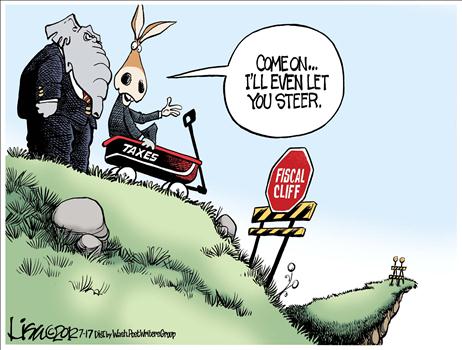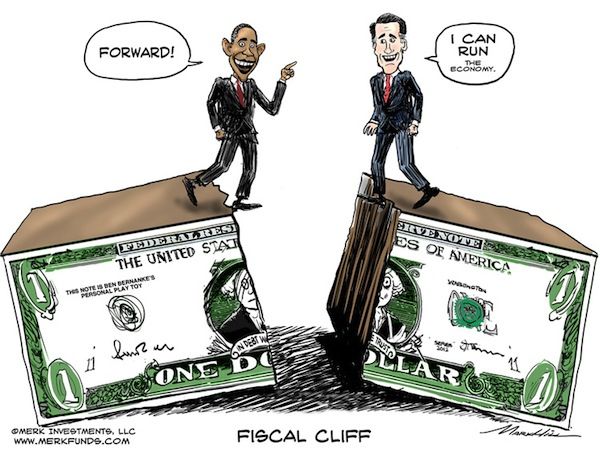I realize that nearly everyone is being distracted by the Presidential Debates, but while you're paying attention to that, this is happening:
http://bonds.about.com/od/Issues-in-the-News/a/What-Is-The-Fiscal-Cliff.htm
I think this is a fairly concise description. How many of you were actually aware that this is happening? Anyone? Bueller?
Here's some recent news about it:
http://www.foxbusiness.com/news/2012/10/17/csx-says-fiscal-cliff-could-trip-slow-growth-economy/
In other words, the economy is ALREADY slowing in anticipation of the Fiscal Cliff, or in doubt over what action will (or will not) be taken by Congress.
http://www.foxbusiness.com/investing/2012/10/17/making-bullish-case-on-looming-fiscal-cliff/
This article puts a positive spin on things, but it depends on Congress acting. Will Congress act? Not with the GOP and the DNC controlling things, it won't. They'll point fingers at each other, but they won't actually DO anything.
https://www.fidelity.com/viewpoints/fiscal-cliff
http://blogs.wsj.com/economics/2012...iscal-cliff-may-be-higher-than-experts-think/
The most optimistic outlook I could find was this:
http://money.cnn.com/2012/10/01/news/economy/fiscal-cliff-economists/index.html
Well, that would be a 'best case' scenario, and by the way, averting that crisis means kicking the can down the road - the deficit does not get cut, so it just postpones the inevitable for a little longer AGAIN.
And given all of that, people prefer to talk about who said what during a presidential debate.
Incredible.
http://bonds.about.com/od/Issues-in-the-News/a/What-Is-The-Fiscal-Cliff.htm
The Fiscal Cliff Explained
Fiscal cliff is the popular shorthand term used to describe the conundrum that the U.S. government will face at the end of 2012, when the terms of the Budget Control Act of 2011 are scheduled to go into effect.
Among the laws set to change at midnight on December 31, 2012, are the end of last years temporary payroll tax cuts (resulting in a 2% tax increase for workers), the end of certain tax breaks for businesses, shifts in the alternative minimum tax that would take a larger bite, the end of the tax cuts from 2001-2003, and the beginning of taxes related to President Obamas health care law. At the same time, the spending cuts agreed upon as part of the debt ceiling deal of 2011 will begin to go into effect. According to Barron's, over 1,000 government programs - including the defense budget and Medicare are in line for "deep, automatic cuts."
In dealing with the fiscal cliff, U.S. lawmakers have a choice among three options, none of which are particularly attractive:
They can let the current policy scheduled for the beginning of 2013 which features a number of tax increases and spending cuts that are expected to weigh heavily on growth and possibly drive the economy back into a recession go into effect. The plus side: the deficit, as a percentage of GDP, would be cut in half.
They can cancel some or all of the scheduled tax increases and spending cuts, which would add to the deficit and increase the odds that the United States could face a crisis similar to that which is occurring in Europe. The flip side of this, of course, is that the United States' debt will continue to grow.
They could take a middle course, opting for an approach that would address the budget issues to a limited extent, but that would have a more modest impact on growth.
I think this is a fairly concise description. How many of you were actually aware that this is happening? Anyone? Bueller?
Here's some recent news about it:
http://www.foxbusiness.com/news/2012/10/17/csx-says-fiscal-cliff-could-trip-slow-growth-economy/
CSX Corp. (CSX) Chief Executive Michael Ward said Wednesday that the looming "fiscal cliff" of steep government spending cuts and tax increases could derail what he otherwise anticipates will be a continued slow-growth U.S. economy next year.
"Hopefully, once the election is over, cooler heads will prevail" and lawmakers will work to resolve the issue, Mr. Ward said in an interview.
But he said uncertainty regarding the issue among businesses and consumers has been a big contributor to a slowdown in the economy, and in his railroad's freight volumes, over the past few months.
In other words, the economy is ALREADY slowing in anticipation of the Fiscal Cliff, or in doubt over what action will (or will not) be taken by Congress.
http://www.foxbusiness.com/investing/2012/10/17/making-bullish-case-on-looming-fiscal-cliff/
The Bullish Case on the Looming Fiscal Cliff
By Matt EganPublished October 17, 2012
If the U.S. falls off the fiscal cliff at the end of the year, forecasters warn the economy will likely plunge into a recession and the stock market will suffer a painful retreat.
This looming batch of almost $600 billion of tax hikes and spending cuts is already being blamed for todays sluggish economy. Businesses and consumers have hunkered down amid deep skepticism that Washington can actually throttle back on its partisan bickering to reach a compromise before the year-end deadline.
Of course, there is a flip side to those very real concerns. If lawmakers surprise everyone by hammering out a deal that both prevents the U.S. from falling over the fiscal cliff while also changing the countrys alarming fiscal trajectory, it would likely provide a huge stimulus to both the economy and Wall Street.
This article puts a positive spin on things, but it depends on Congress acting. Will Congress act? Not with the GOP and the DNC controlling things, it won't. They'll point fingers at each other, but they won't actually DO anything.
https://www.fidelity.com/viewpoints/fiscal-cliff
Fiscal cliff ahead: What it may mean
Risks to the economy and stocks are high if all tax hikes and spending cuts take effect.
FIDELITY VIEWPOINTS 06/28/2012
Without congressional action, up to $600 billion of expiring tax cuts, new taxes, and automatic spending cuts are set to take effect at the end of 2012 or beginning of 2013. If they hit all at once, the impact could amount to as much as 4%-5% of GDP, according to our research, the equivalent of falling off a fiscal cliff. Some experts anticipate the economy would experience a significant slowdown and there would be major consequences for financial markets.
http://blogs.wsj.com/economics/2012...iscal-cliff-may-be-higher-than-experts-think/
October 16, 2012, 5:14 PM
Chances of Going Over Fiscal Cliff May Be Higher Than Experts Think
By Jeffrey Sparshott
What are the odds of the U.S. running off the so-called fiscal cliff the mix of spending cuts and tax increases that would likely tip the U.S. into recession?
On average, economists in the latest Wall Street Journal economic forecasting survey put the probability at just 17%, but some economists and analysts say that may be too low.
Our view remains that the debate in D.C. following the election will be contentious beyond precedent and that this difficulty in finding common ground suggests the odds of going over the cliff are higher than people seem to appreciate, RBC Capital Markets chief U.S. economist Tom Porcelli said Tuesday in a note to clients.
Unless the White House reaches a deal with Congress, the Bush-era tax cuts are scheduled to expire at year-end, raising tax rates on more than 100 million Americans. Another $100 billion in spending cuts on military and other government programs are set to kick in. Other smaller tax policy changes also are looming.
RBC expects gross domestic product, the broadest measure of economic output, will shrink by 0.9% in the first quarter of next yeara forecast that incorporates the full impact of the fiscal cliff.
In a separate research note out Tuesday, Guggenheim Partners senior policy analyst Chris Krueger said, the risks of going off the cliff (and staying off) are hugely underappreciated.
The most optimistic outlook I could find was this:
http://money.cnn.com/2012/10/01/news/economy/fiscal-cliff-economists/index.html
NEW YORK (CNNMoney) -- Getting economists to agree on almost anything is tough. But on the subject of the fiscal cliff, a survey by CNNMoney found an almost unanimous consensus.
Of 17 top economists surveyed, 14 believe the end of tax breaks and the steep federal spending cuts set to take effect at the start of next year would cause the economy to tumble into a new recession.
Twelve of them believe the fiscal cliff is the most serious risk facing the economy, more serious than the European sovereign debt crisis, business uncertainty about various government regulations or the continued weakness in the job and housing markets.
"Should gridlock prevail, business sector investment and hiring will be stymied, and the household sector will sharply curtail spending," said Patrick O'Keefe, director of economic research for accounting firm JH Cohn.
But all 17 agree on one thing -- the economy won't plunge over the fiscal cliff.
Despite partisan bickering ahead of the election, all the economists said they believe Democrats and Republicans will come together to extend the tax breaks and prevent the spending cuts either during the lame duck session of Congress or early in the new year.
Well, that would be a 'best case' scenario, and by the way, averting that crisis means kicking the can down the road - the deficit does not get cut, so it just postpones the inevitable for a little longer AGAIN.
And given all of that, people prefer to talk about who said what during a presidential debate.
Incredible.






